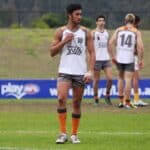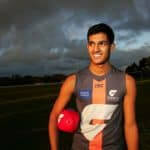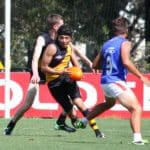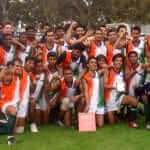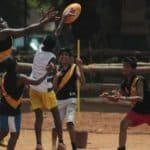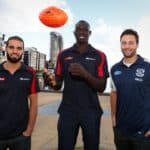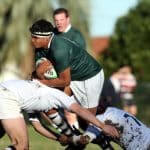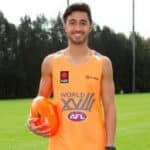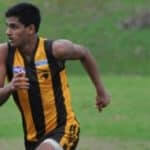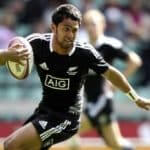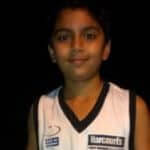The Indian community is moving away from the stereotypes in the sporting world to become involved in footy across various levels, writes RAJNI ANAND LUTHRA
When Trevor Banerjee arrived in Australia ten years ago as an international student, he found himself drawn to Aussie Rules Football. He thought at first it was because his extensive basketball and soccer experiences were giving him an advantage on the field. While that may have been true, he soon realised that what the sport was offering him, was a platform to connect with the mainstream community.
“There is an essential yaarana about AFL that I simply love,” he says. “It’s called ‘shepherding’: I have the ball, and if someone tackles me, my guys will protect me. On the field, your differences dissolve; you look after others like your own brothers”.
He got so involved with the game that he played in the 2011 AFL International Cup, pitching in as a local for a team from India, the Indian Tigers, that did not have enough numbers.
That experience urged him to want to launch a community team, to initiate Indian-Australians into the game.
Indians for AFL? You must be joking!
He got no support from the Indian community. No one will be interested, he was told; there will be no players, and no sponsors.
Today, his Masala FC is not only up and running, but has been winning games, attracting sponsorships and drawing players. Its players come not only from the subcontinent but also from Zimbabwe, Afghanistan and Russia. A junior team is on the cards, and Banerjee’s dream is that one day there will be a women’s team in the club.
“When I tell an Australian that I’m a part of an AFL team, there’s a sparkle in their eye which is priceless,” Trevor says.
Sport can indeed be an effective tool to help migrants integrate into society.
Contact sports have never had a large following among Indians – unless the traditional kabaddi can be considered one! But times are changing, with the mass appeal of these rubbing off on migrant Indian communities in Australia and New Zealand. South Asian-origin players are taking to AFL, Rugby Union and Rugby League at the lower levels like never before, and while we still wait for one of us to make a mark with the Baggy Green, who’s to say a footy or rugby player doesn’t get there first? Hey, if Chinese-American Jeremy Lin could excel at the National Basketball League…
It might be a thing of the past to say that Indians lack the physique for these sports.
Sport administrators have themselves begun reaching out to multicultural communities like never before.
A number of clubs are approaching the Indian community with opportunities to engage with their particular leagues.
AFL’s Essendon Football Club for instance is focussing on the north-west of Melbourne which has a sizable Indian population, with Dyson Heppell as its Indian Ambassador. It entered an Indian team in this year’s Unity Cup, which focuses on strengthening ties with Police, Muslim and other CALD communities through a mutual appreciation of Australian Rules football. The ‘Bharat Bombers’ won two out of their four games.
Richmond has defender Bachar Houli, a practising Lebanese Muslim, as its Multicultural Ambassador.
Other clubs have specially appointed multicultural development officers or community engagement officials to design programs to deliver specific outcomes to targeted communities.
Even smaller scale token efforts are making a mark, such as AFL’s invite to Bollywood actor Vidya Balan when she was in Melbourne earlier this year, to present the match ball to the referees before the start of a game. (She did so in a bright red sari with a backless blouse, the chill in the air notwithstanding. She admitted she was not familiar with the game at all, but that she was looking forward to the “eye candy”).
And in the midst of all these efforts, we have individual members of the community shining forth with flashes of brilliance, at various levels of the game. While some are starting to push through and make a mark, others are impressing simply with their passion and commitment to a game they did not know growing up, but have since embraced.
And in all of them, the lifting of the gaze away from the all-pervading cricket ball, to try a differently shaped one, is truly commendable.
Representing Australia in the Universities World Cup
Jason Ram is about to reach a milestone in his Rugby League career. Next year, he will have played for 25 straight years. And he is only 29 years old.
“If my body is still holding, I will definitely consider going further”.
Jason’s family moved to Sydney from his native Fiji when he was five years old. He had already been introduced to the game by an uncle who represented Fiji in Rugby Union. But when he saw his first game here in Australia – the Cronulla Sharks were playing – he was hooked.
Andrew Ettinghausen has been a lifelong hero.
“His speed and ability, those length-of-the-field tries, were something I wanted to replicate”.
In 2008, Jason represented Australia in the Universities’ World Cup as a Sydney Uni student, and this urged him to try out for Fiji’s national team. He didn’t make it ultimately, but won a chance to play in the American National Rugby League, for the Philadelphia team Glen Mills Bulls.
“A fantastic opportunity, it was a development thing for their players. I absolutely loved that experience”.
Has he ever felt disadvantaged due to his racial background?
“No, not really, but it can be good to know a few people here and there! Develop your talents and you will be noticed… they’ll be willing to take you on!”
Today Jason plays half-back with the Bass Hill Broncos. But currently, he’s nursing an injury.
“Last weekend I got poked in the eye, and two days on I’m just getting my vision back!”
His injuries list is rather long, Jason reveals.
“I’ve dislocated my right shoulder five times and my left shoulder six times. But you know, injuries are part and parcel of sport, any sport really. You’d think golf is not strenuous, but Tiger Woods has had double knee trouble, shoulders… The fitter you are, the less likely you are to get hurt, so look after yourself”.
Jason’s message to the Indian community is to get out there and get involved in the game, even as spectators.
“It’s a great game to watch, a wonderful spectacle, and can be a great day out. Support a local team, or an NRL team, and come join the fun!”
Making the first fifteen at Trinity Grammar
Manish Poologasundram, school captain at Sydney’s Trinity Grammar School has been a Rugby Union player since he was eight years old. Today he is in the school’s first fifteen.
“I started in the C team,” Manish reveals. “But there was great desire and much commitment, and the coaches saw my eagerness”.
In fact, the 17-year-old claims his rugby career so far has taught him that if he puts his mind to anything, he can attain it.
“That’s why I am school captain”.
What brought him to rugby?
“Rugby involves teamwork more than any other sport. Cricket is a team game but it is still played by eleven individuals”.
He adds that he has benefitted academically thanks to rugby.
“As a Year 12 student, I’m currently preparing not only for the HSC but also the IB, and am about to sit the UMAT. I’m ready for it all. Training 5 days of the week and playing on the 6th, I have a very tight schedule, and that forces me to have a very structured study routine. In fact rugby is a great break from studies”.
He counts rugby greats such as David Pocock, Nathan Sharpe, Martin Johnson and Chris Jack as his inspirations.
“Even if you have a little desire, I’d say, go for it, give it a try,” he urges. “My brother only tried the sport in his last year of school. He says it is his biggest regret that he did not play before!”
His mum Anjali is his biggest fan. “I did not follow the game till Manish played. Initially I was concerned about injuries etc, but he was always so keen, and my husband Hari was so supportive, I didn’t want to stop them”.
Manish dreams of playing with West Harbour one day.
Captain of the Under 16s
Damendeep Singh Aujla of Lalor, Melbourne, has just returned from a successful tour in Sydney at the NAB AFL Under-16 Championships. As captain, he took his team to a first-ever Division 3 victory, after being undefeated in all three games. Coach Anthony Koutoufides, former Carlton captain, described Damen as “one of the most talented boys in the team and certainly one of the better players in Sydney”.
Damen was discovered by AFL during a weekend camp in which 40 boys participated. He was among the 15 picked finally to make up the team for the Sydney event.
Damen comes from a family of sportsmen, traditional wrestlers who go back centuries. But this 16-year-old found himself loving footy at eight years of age.
“My friends got me into footy, and when I got a chance to play in the TAC Cup, I realised I was good at it and decided to put everything into it”.
With support from his family (who took time out to watch him play at Sydney), Damen dreams of future prospects in the game.
Currently, he trains 6 days of the week, and competes on Sundays, fitting his Year 12 studies around his sporting schedule
“He’ll definitely go far,” Coach Koutoufides says of him.
A NSW-ACT Ram
At the same event last year, Angad Roy of Sydney became the first-ever player of Indian origin to represent NSW-ACT, playing for the Under-16 Rams side. Angad is currently taking time off from the sport for school reasons, and is already feeling antsy at not having played in recent months. He trained with the Slater & Gordon Giants Academy for three years where he had Ryan Hulihan, who played 200+ games for Carlton, as coach and mentor.
“I am drawn to AFL (more than other sports) because of the fact that you have to be good at so many different things, such as kicking, handballing, fitness and pace,” observes Angad. “You need to have this to be successful and none of it comes without practice. This challenge has provided me with a work ethic not only in AFL, but in most parts of my life”.
He adds, “I have found I have improved a lot not only in terms of my AFL skills, but things like discipline, diet and the way I conduct myself overall”.
Life skills from rugby
49-year-old investment advisor Manjit Singh of Sydney was first exposed to Rugby Union as a young kid in Mumbai’s exclusive Cathedral and John Connon School, and continues to play to this day.
“At school I just wanted to be different because everyone else played cricket or hockey,” he laughs. “But I fell in love with the game. At that time India only had 10 teams that played, so as school kids if we wanted to play, we had to play against the men. I Didn’t realise at that time how important rugby was going to be in my life. In 1980, my family moved to Australia and I can confidently say that playing the game helped me make friends and to assimilate”.
Manjit played at school and with the Wahroonga Tigers, and later began to coach with the club.
Why rugby?
“Rugby is a very inclusive game with a great sporting spirit, one of the very few games in the world that brings players together rather than dividing them. Like most team sports it provides great life learning skills – working under pressure, working for the team, working with the team, understanding your role in the overall effort, and relating to people from all walks of life”.
Today he plays with the community-based Killara West Pymble Rugby club, and continues to coach.
“Coaching and Killara West Pymble is all about giving back to a sport that has given me so much,” he reveals.
Community efforts with Collingwood
As Collingwood Football Club’s Community Engagament Officer, Harmit Singh likes to tell people his job is all about educating new Australians about football.
“In my six years with the club, I have seen some 2,500 school kids in Victoria go through our programs,” he tells Indian Link. “We run clinics to teach the sport, bring the kids to the club for a look around, we give them tickets to games. We get the message across that football is a major part of Aussie life”.
AFL has been a major part of Harmit’s own life. He plays today for Morwell, and coached the Indian Tigers team for the 2011 AFL International Cup.
Something different from cricket
A practicing Muslim, 23-year-old Yasser Hussain is not playing footy in the ongoing Ramadan period. But he continues to be involved with Masala FC, and promoting the game in the Indian community.
Arriving from India as a 5-year-old, he had an early introduction to the game with Auskick, moving on to the Juniors up to the Under-15 level with the Glen Waverley Rovers and Under-17s with Northvale.
“My parents must really be credited with that initial push,” he reveals. “They wanted me to try something other than cricket! And luckily I found that my cricket skills transferred well to footy”.
Moving to Abu Dhabi for two years, Yasser played there when the Mid-Eastern League started off.
“That’s where I bumped into Ash Nugent and we talked about promoting the game in India”.
Yasser’s mum Aain is a regular at all his matches, and has won the admiration of his teammates.
“She wears her scarf to the field, bringing not only an Indian, but also an Islamic aspect to the game!”
Aain herself says, “Yes I am very involved and enjoy supporting my son. In fact, sometimes I cheer so hard that my husband begins to avoid me! Yasser is a die-hard fan of the game and has taken me to see the big games at the MCG”.
Dad’s approval
Ten-year-old Prithish Pancholi of Melbourne is very proud to declare that his team, Glen Waverley Rovers Junior Football Club, is currently “first on the ladder”.
His interest in the game comes through loud and clear as he rattles off his training schedule. He’ll tell you he likes the game because it’s lots of fun and a lot of his mates are on his team.
“I play in the back line,” he reveals. “I like it because the coach put me there, and also because the ball comes quite often”.
Do mum and dad come to watch him play?
“Dad does, and he shouts ‘Good job!’ from the sidelines”.
With reports by Ritam Mitra and Sujith Krishnan
Many cultures, one game
In a bid to recognise, embrace and encourage greater involvement of multicultural communities, the Australian Football League launched the 2013 Multicultural Round in Melbourne recently. Under the logo ‘Many Cultures. One Game,’ the AFL has implemented several initiatives to engage multicultural communities and promote social harmony.
“It is important the AFL reflects cultural diversity, providing an environment which welcomes people from all backgrounds to enjoy our game as supporters, players or administrators in the future,” said AFL Head of Diversity, Jason Mifsud, on the occasion.
According to Misfud, AFL remains committed to strengthening the landscape of opportunities available for their multicultural community group. “We are also proud to see AFL players from non-multicultural backgrounds supporting multiculturalism, as the entire AFL community, irrespective of background, strives to strengthen diversity, inclusion and cultural understanding in our game,” he said.
Over the year, several multicultural talent academies were held in each Australian state and an Under-16 world team was selected to participate in the NAB AFL championships held in Sydney to coincide with the multicultural round. Under the Australia Post AFL Multicultural School programs, the AFL Multicultural ambassadors have visited 300 schools and brought thousands of culturally diverse people to the game by teaching football skills and reinforcing key themes of leadership, harmony and respect.
The AFL Multicultural round 2013 initiatives include the use of orange flags by umpires to represent social harmony, half time games between junior multicultural teams, and cultural diversity forums being organised in various states. They also include sporting events and programs to introduce the game to international students and consular staff from various countries, and inclusion of performances from multicultural artists.
Preeti Jabbal
Rocking for the Sevens
Young Rocky Khan is being lauded as a player of repute in the Sevens, by MALLIKA GOEL
Twenty-three year old Auckland-resident Rocky Khan isn’t just any ordinary rugby player. He is the first Fijian of Indian ancestry and also the first Rotuman (an island of Fijian dependency) to represent New Zealand in the Wellington Sevens. It’s a big deal! Players of Asian background or descent in any form, are a rarity in top rugby ranks. And the Sevens, with its spot firmly entrenched in New Zealand’s sporting calendar, not to mention cultural scene, may not be the All Blacks proper, but it’s pretty damn close. The event attracts over 30,000 spectators annually. A fast and furious version of rugby, Sevens matches are shorter than their rugby union counterparts, with each game running for two seven-minute halves (the final is played over two 10-minute halves), instead of the usual 40. There are also seven players instead of 15. 16 international teams compete for points that go towards the world series.
The event has become known as much for the sport, as for the creativity and celebration that surrounds it. Today the Sevens is about celebrating the diversity of New Zealanders, in all their shapes, sizes, costumes and backgrounds. And with New Zealand’s massive ethnically diverse population – the fastest growing of which is Asian – it is appropriate (if not long overdue) for some of this cultural diversity to come through on the field.
When questioned about his unique position and all the historic ‘firsts’ he is making, the young player comes across as pretty modest.
“I am young and have a long way to go in the game,” Rocky says. “Obviously, I would love to play for New Zealand as I grew up an All Blacks fan but yeah, I’d still consider the offer to represent Fiji if it came my way”.
Rocky might downplay the significance of his role in having made the big leagues – but the rest of his homeland certainly isn’t. With headlines like ‘Let us rock you’ and ‘Living the Dream’, it is evident that he’s making waves across the board. Rocky’s success could help other kids realise their dreams too. To say New Zealanders are fanatical about their rugby would be an understatement; kids grow up living and breathing it, and dreaming of being an All Black. Rocky Khan has just shown New Zealand’s migrant population that anything’s possible: “Just keep working hard, and doing something everyday that will help you achieve your goals and don’t stop doing it until you’ve reached that goal,” is his advice.





